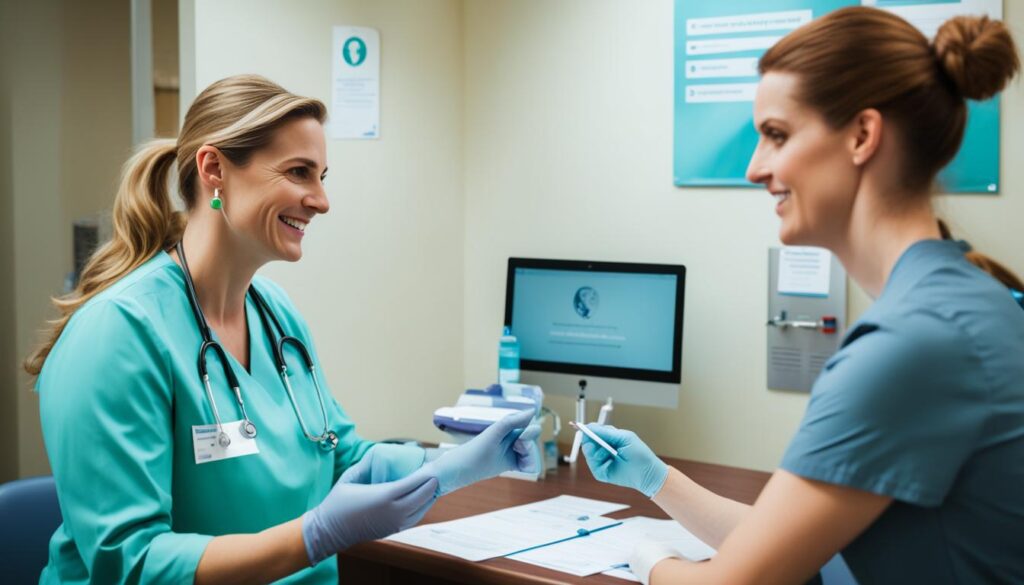Health insurance is a crucial factor in determining access to healthcare services. It plays a significant role in ensuring timely and appropriate use of personal health services, leading to improved health outcomes. Lack of health insurance coverage is a major barrier to accessing healthcare, with out-of-pocket costs often preventing individuals from seeking necessary care. Studies have shown that uninsured individuals are less likely to receive preventive services for chronic conditions and may delay or forgo needed care. On the other hand, having health insurance is associated with better access to healthcare services and improved health monitoring. Medicaid coverage, in particular, has been found to significantly increase the chances of receiving a diagnosis and using necessary medications for conditions like diabetes. However, health insurance alone is not sufficient to overcome all barriers to care, as limited availability of healthcare resources and transportation issues also impact access to healthcare services.
Key Takeaways
- Health insurance is crucial for accessing healthcare services.
- Uninsured individuals are less likely to receive necessary care and preventive services.
- Having health insurance improves access to healthcare services and health monitoring.
- Medicaid coverage increases the chances of receiving a diagnosis and using medications.
- Availability of healthcare resources and transportation issues also affect access to care.
Image:
Through health insurance, individuals can overcome financial barriers and have better access to healthcare services, improving their overall health outcomes. However, it is important to address the existing barriers to care such as limited availability of healthcare resources and transportation issues to ensure equal access for all individuals.
The Impact of Inadequate Health Insurance Coverage
Inadequate health insurance coverage is a significant barrier to accessing healthcare services, contributing to disparities in health and creating obstacles for individuals to receive the care they need. The unequal distribution of coverage and the high number of uninsured adults exacerbate the issue, particularly affecting lower-income individuals and minority groups.
One of the primary consequences of inadequate health insurance coverage is the delay or avoidance of essential care. Out-of-pocket costs associated with healthcare services, such as doctor visits, dental care, and prescriptions, deter individuals from seeking necessary treatment. This delay in accessing care can have severe repercussions, impacting overall health outcomes and the prevention and management of chronic conditions.
Furthermore, inadequate health insurance coverage limits access to preventive services, particularly for chronic conditions like diabetes and cancer. Without coverage, individuals are less likely to receive regular check-ups, screenings, and necessary vaccinations, leading to missed opportunities for early detection and intervention. The consequences are particularly critical for uninsured children, who may miss out on immunizations and well-child visits, resulting in potential long-term health issues.
The impact of inadequate health insurance coverage is compounded by the unequal distribution of coverage across socioeconomic groups. Lower-income individuals and minority populations are disproportionately affected, facing higher rates of uninsurance and limited access to necessary healthcare services. This perpetuates existing health disparities and exacerbates inequalities in health outcomes.
Uninsured individuals are more likely to delay or forgo essential care, leading to negative health outcomes and further exacerbation of health disparities.
To address the negative consequences of inadequate coverage, it is essential to expand insurance options and eliminate barriers to healthcare access. Efforts should focus on providing affordable coverage options, improving the availability of subsidized insurance plans, and expanding eligibility criteria for programs like Medicaid. Additionally, programs that support low-cost or no-cost preventive services and screenings can help bridge the gap for uninsured individuals and improve overall health outcomes.
It is crucial to recognize that inadequate health insurance coverage is not solely a financial issue but also a barrier to accessing essential healthcare services. By addressing the barriers associated with inadequate coverage and working towards equitable distribution, we can ensure that everyone has the opportunity to access the care they need to maintain optimal health.
| Impact of Inadequate Health Insurance Coverage | Consequences |
|---|---|
| Delayed or avoided essential care |
|
| Limited access to preventive services |
|
| Unequal distribution of coverage |
|
The Importance of Health Insurance in Improving Access to Care

Health insurance plays a crucial role in improving access to healthcare services and promoting better health monitoring. Numerous studies have shown that individuals with health insurance are more likely to utilize basic clinical services and receive necessary preventive services.
For instance, when previously uninsured adults become eligible for Medicare at age 65, their utilization of clinical services increases significantly, allowing them to access the care they need. Additionally, providing Medicaid coverage to previously uninsured adults has been proven to increase the chances of receiving a diabetes diagnosis and using diabetic medications, ensuring better management of this chronic condition.
Moreover, health insurance coverage is critical for children with special health needs or chronic illnesses to access the necessary healthcare services. It helps to facilitate timely interventions, provide appropriate treatments, and monitor their health more effectively.
When health insurance is combined with a regular source of care, it further enhances the appropriate utilization of healthcare resources. Individuals with health insurance are more inclined to seek preventive services such as regular check-ups, vaccinations, and screenings, which are vital for early detection and prevention of chronic diseases.
“Health insurance coverage can be a game-changer in ensuring individuals have access to essential health services and can effectively monitor their health.”
By removing the financial barriers to care, health insurance increases the utilization of clinical services and preventive care, leading to improved health outcomes. It empowers individuals to proactively manage their health and seek early interventions when necessary. Overall, health insurance plays a critical role in promoting improved access to care, better health monitoring, and increased utilization of clinical services.
The Benefits of Health Insurance in Improving Access to Care
| Benefits of Health Insurance Coverage | Description |
|---|---|
| Improved Access to Care | Health insurance provides individuals with the financial means to access necessary healthcare services without significant out-of-pocket expenses. |
| Better Health Monitoring | With health insurance, individuals can access regular check-ups, screenings, and preventive services, allowing for proactive health monitoring and early detection of potential health issues. |
| Preventive Services | Health insurance coverage enables individuals to receive recommended preventive services such as vaccinations, screenings, and counseling, preventing the onset or progression of chronic diseases. |
| Increased Utilization of Clinical Services | Health insurance eliminates financial barriers, enabling individuals to seek timely and appropriate clinical services, ensuring better management of acute and chronic conditions. |
Barriers to Accessing Healthcare Services

In addition to inadequate health insurance coverage, limited availability of healthcare resources and transportation barriers are significant obstacles that impede access to necessary healthcare services. These barriers, coupled with physician shortages and late-stage presentation of medical conditions, exacerbate health disparities and hinder timely access to essential care.
The Impact of Limited Availability of Healthcare Resources
The limited availability of healthcare resources, including a shortage of physicians, has far-reaching implications for patients seeking medical care. A shortage of healthcare providers can result in longer wait times for appointments, delayed diagnoses, and restricted access to specialized treatments. Patients may experience difficulties finding available providers who are equipped to address their specific healthcare needs, leading to delays in accessing appropriate care.
Transportation Barriers and Inconvenience
Transportation barriers present significant challenges to consistent access to healthcare services, particularly for individuals from racial/ethnic minority groups and underserved communities. Lack of access to reliable transportation can prevent individuals from attending scheduled appointments, receiving necessary treatments, or accessing vital healthcare services. This can have serious implications for their health outcomes and overall well-being.
Studies have shown that transportation barriers are associated with a higher risk of severe illness, as individuals may delay seeking medical attention due to challenges in reaching healthcare facilities. Late-stage presentation of medical conditions, such as breast cancer, is a potential consequence of transportation barriers. These barriers can hinder timely diagnosis and treatment, leading to more advanced stages of the disease, reduced treatment options, and poorer prognosis.
To address transportation barriers, strategies such as expanding public transportation options, implementing telehealth services, and providing transportation assistance programs can help improve access to healthcare for individuals facing these challenges.
Transportation barriers can have dire consequences for individuals seeking necessary healthcare services, especially those from underserved communities. Improving transportation options and implementing innovative solutions such as telehealth can help bridge the gap and ensure equitable access to healthcare.
Addressing Barriers to Improve Healthcare Access
Efforts to overcome barriers to accessing healthcare services require a comprehensive approach. This includes addressing limited availability of healthcare resources by promoting the recruitment and retention of healthcare professionals, particularly in underserved areas. Additionally, investing in healthcare infrastructure and expanding the capacity of healthcare facilities can help alleviate the strain on resources and reduce wait times for patients.
Addressing transportation barriers calls for initiatives that enhance transportation options, improve public transportation networks, and develop targeted transportation assistance programs for individuals who face challenges in reaching healthcare facilities. Furthermore, innovative solutions such as telehealth can provide an alternative means of healthcare access, particularly for individuals in rural or remote areas.
By addressing these barriers collaboratively, healthcare systems can strive towards equitable access to healthcare services, ultimately improving health outcomes and reducing health disparities.
| Barriers to Accessing Healthcare Services | Impact |
|---|---|
| Limited availability of healthcare resources | Longer wait times for appointments; delays in accessing specialized treatments; difficulty finding available providers |
| Transportation barriers and inconvenience | Challenges in attending appointments; delays in receiving necessary treatments; difficulty accessing healthcare services; higher risk of severe illness; late-stage presentation of medical conditions |
The Role of Health Insurance in Reducing Health Disparities

Health insurance plays a significant role in reducing health disparities by addressing the unequal distribution of coverage, especially among racial and ethnic minority groups. Disparities in health arise from various factors, including social determinants of health and barriers to healthcare access. Lack of health insurance coverage is a key contributing factor to these disparities.
Racial and ethnic disparities in health insurance coverage persist, with minority groups accounting for a significant proportion of the uninsured population. This unequal distribution of coverage creates barriers to accessing preventive services and timely care for chronic conditions. Without health insurance, individuals are less likely to receive the preventive services necessary for early detection and management of diseases. This can lead to the worsening of health conditions and the development of more severe complications.
However, studies have shown that when individuals have access to health insurance, especially through programs like Medicaid, there is an improved utilization of preventive services and a reduction in racial and ethnic disparities. Health insurance coverage enables individuals to receive the necessary preventive care, such as screenings and vaccinations, which can lead to earlier identification of health issues and better overall health outcomes.
“Health insurance coverage is a crucial step towards reducing health disparities and ensuring equal access to preventive services for all individuals.”
Promoting Equity through Improved Access to Preventive Services
One of the key ways health insurance reduces health disparities is by improving access to preventive services. Preventive care is essential for the early detection and management of diseases, reducing the burden on healthcare systems and improving long-term health outcomes.
Through health insurance coverage, individuals have the resources to access regular check-ups, screenings, and vaccinations. This is especially important for vulnerable populations who may face barriers to care due to socioeconomic factors or discrimination. By providing equal access to preventive services, health insurance helps bridge the gap in health disparities and promotes equity in healthcare.
For example, health insurance coverage can facilitate access to cancer screenings, such as mammograms and colonoscopies. This early detection can lead to timely intervention and treatment, improving survival rates and reducing disparities in cancer outcomes.
The Impact of Health Insurance on Timely Care
Timely access to healthcare is critical for early intervention and proper management of health conditions. Health insurance plays a vital role in ensuring individuals can receive timely care when needed, reducing disparities in healthcare outcomes.
With health insurance, individuals have access to a network of healthcare providers and resources, enabling them to schedule appointments promptly and receive timely interventions. This is particularly crucial for individuals with chronic conditions that require regular monitoring and treatments.
Furthermore, health insurance coverage helps alleviate financial barriers that may otherwise prevent individuals from seeking care promptly. By reducing out-of-pocket costs, health insurance removes a significant obstacle to timely healthcare access, ensuring that individuals can receive the care they need when they need it.
Reducing Health Disparities through Health Insurance
Improving access to health insurance is a crucial step towards reducing health disparities and ensuring equitable healthcare access for all individuals. By addressing the unequal distribution of coverage and enabling better access to preventive services, health insurance plays a vital role in promoting health equity.
Efforts to expand health insurance coverage, particularly among minority populations, are essential for reducing disparities in health outcomes. Providing affordable and comprehensive health insurance options that cover preventive services and timely care is a crucial component of achieving optimal health for all individuals.
The Impact of Health Insurance on Preventive and Screening Services

Health insurance coverage plays a critical role in ensuring access to preventive and screening services. Individuals with health insurance are more likely to receive these essential healthcare services and receive them in a timely manner. The availability of health insurance coverage facilitates access to a regular source of care, increasing the likelihood of individuals receiving appropriate preventive and screening services.
Studies have demonstrated that uninsured individuals face significant barriers to accessing recommended screenings for conditions such as breast cancer, cervical cancer, and colorectal cancer. Without health insurance coverage, individuals may delay or forgo these screenings, missing out on crucial opportunities for early detection and treatment.
Having health insurance not only increases the likelihood of receiving preventive and screening services but also helps reduce racial and ethnic disparities in healthcare access. By ensuring equal access to necessary healthcare screenings, health insurance plays a vital role in promoting health equity and addressing disparities in healthcare outcomes.
Importance of Timely Service Receipt
Timely receipt of preventive and screening services is crucial for early detection and intervention, improving health outcomes. Health insurance coverage facilitates prompt service receipt by providing individuals with the financial support necessary to access these services without cost barriers. When individuals have health insurance, they are more likely to pursue preventive care and follow recommended screening guidelines, leading to better overall health outcomes.
“Ensuring access to preventive and screening services is essential for early detection of health conditions, enabling early intervention and improving health outcomes.” – American Medical Association
Regular source of care is another critical aspect facilitated by health insurance coverage. When individuals have a regular source of care, such as a primary care physician, they are more likely to be proactive in seeking preventive and screening services. Health insurance provides individuals with the financial stability to establish and maintain a regular source of care, ensuring ongoing monitoring of their health and timely receipt of necessary services.
The Role of Health Insurance in Reducing Racial and Ethnic Disparities
Health insurance coverage plays a significant role in reducing racial and ethnic disparities in the receipt of preventive and screening services. Racial and ethnic minority groups often face barriers such as limited access to healthcare resources and financial constraints, which contribute to disparities in healthcare utilization and outcomes.
By providing individuals from diverse backgrounds with health insurance coverage, we can help ensure equal access to necessary healthcare screenings and reduce disparities in service receipt. This includes addressing linguistic and cultural barriers by promoting language access services and culturally sensitive care.
Overall, health insurance coverage significantly impacts the receipt of preventive and screening services. By enabling timely service receipt and addressing disparities, health insurance plays a crucial role in promoting early detection, improving health outcomes, and reducing racial and ethnic disparities in healthcare access.
The Relationship Between Health Insurance and Health Outcomes

Health insurance coverage has a significant impact on health outcomes, as evidenced by numerous studies. Individuals with health insurance experience decreased mortality rates, improved health outcomes, and a higher sense of well-being.
Having health insurance plays a crucial role in facilitating early diagnosis and treatment, leading to better health outcomes for various conditions. By providing coverage for regular check-ups and preventive care, health insurance enables individuals to detect and address potential health issues before they worsen. This proactive approach helps prevent the progression of diseases and improves overall health outcomes.
A prime example of the positive impact of health insurance is the expansion of coverage through programs like Medicaid. Studies have shown that coverage expansion significantly reduces mortality rates, particularly cardiovascular mortality. This highlights the importance of accessible and comprehensive health insurance policies in promoting favorable health outcomes and ultimately saving lives.
Moreover, individuals with health insurance report better overall health and a heightened sense of well-being. The financial security and peace of mind that come with having health insurance contribute to a greater quality of life. Knowing that medical expenses are covered and essential healthcare services are accessible alleviates the stress associated with healthcare affordability, enabling individuals to focus on their well-being.
Health insurance also plays a vital role in supporting appropriate healthcare utilization. When individuals have insurance coverage, they are more likely to seek regular medical care and follow through with necessary treatments. This adherence to appropriate healthcare practices contributes to improved health outcomes and reduced mortality rates.
Quote:
“Health insurance coverage provides individuals with the necessary resources to prioritize their health, seek timely care, and effectively manage their well-being.” – Dr. Emily Miller, Senior Researcher at the Health Policy Institute
The relationship between health insurance and health outcomes is multifaceted and supported by comprehensive research. Health insurance coverage not only safeguards financial security but also ensures access to timely and appropriate healthcare services. By reducing mortality rates, improving health outcomes, and enhancing the overall sense of well-being, health insurance plays a crucial role in promoting a healthier society.
Impact of Health Insurance on Health Outcomes
| Health Outcome | Effect of Health Insurance |
|---|---|
| Mortality Rates | Decreased mortality rates, especially with coverage expansion programs like Medicaid |
| Health Outcomes | Improved health outcomes for various conditions due to early diagnosis and treatment |
| Sense of Well-being | Increased sense of well-being and better overall health reported by individuals with health insurance |
Overall, health insurance coverage is a crucial determinant of health outcomes. It empowers individuals to prioritize their health, access necessary care, and experience improved well-being. The positive relationship between health insurance and health outcomes underscores the importance of comprehensive and accessible coverage options for all.
The Benefits of Health Insurance Coverage

Health insurance coverage provides numerous benefits to individuals and communities. It improves financial security by reducing out-of-pocket healthcare costs and protecting against catastrophic expenses. Individuals with health insurance are less likely to report cost as a barrier to care and are more likely to have access to prescription drugs and timely diagnoses.
Health insurance coverage also plays a crucial role in supporting mental health services and substance use disorder treatment, promoting overall well-being. Access to mental health services is essential for individuals to receive the necessary support and treatment for mental health conditions. Through health insurance coverage, individuals can access therapy, counseling, and psychiatric medications, ensuring comprehensive care for mental health needs.
Health insurance coverage not only improves financial security but also reduces cost barriers and enhances access to prescription drugs and mental health services.
Hospitals in states that have expanded Medicaid have seen improved financial performance, resulting in better availability of healthcare services in those communities. This expansion of coverage enables more individuals to receive the healthcare they need, even if they face financial constraints.
Benefits of Health Insurance Coverage:
- Improved financial security: Health insurance coverage reduces out-of-pocket healthcare costs and protects against catastrophic expenses.
- Reduced cost barriers: Individuals with health insurance are less likely to have cost as a barrier to care.
- Increased access to prescription drugs: Health insurance coverage improves access to necessary medication prescriptions.
- Support for mental health services: Health insurance coverage ensures access to mental health services and substance use disorder treatment.
| Health Insurance Benefits | Summary |
|---|---|
| Improved financial security | Reduces out-of-pocket costs and protects against catastrophic medical expenses. |
| Reduced cost barriers | Lessens financial obstacles to accessing necessary healthcare services and treatments. |
| Increased access to prescription drugs | Ensures individuals have affordable access to essential medications as prescribed by healthcare professionals. |
| Support for mental health services | Enables individuals to seek and receive essential mental health services and substance use disorder treatments. |
Overall, health insurance coverage plays a critical role in improving financial security, reducing cost barriers, and supporting access to necessary healthcare services and treatments. It enhances the overall well-being of individuals and communities, promoting better health outcomes and quality of life.
How to get insurance through the ACA Health Insurance Marketplace
To get insurance through the ACA Health Insurance Marketplace, visit healthcare.gov and create an account. Provide information about your household size, income, and any coverage you currently have. Browse available plans and compare their costs and benefits. You may qualify for subsidies or tax credits based on your income. Select a plan that meets your needs and budget. Complete the enrollment process by submitting required documents and paying your first premium. Coverage typically begins on the first day of the following month. Remember to review your options annually during the open enrollment period to ensure you have the best coverage for your circumstances.
Health plans for life’s moments
Health plans for life’s moments provide coverage tailored to various stages and events in life. Whether it’s starting a family, changing jobs, or retiring, these plans offer flexibility and comprehensive coverage to meet evolving healthcare needs. They may include options for preventive care, maternity benefits, mental health services, and more. Additionally, they often offer access to a network of healthcare providers and resources to support overall well-being. By addressing specific life milestones and challenges, these plans aim to ensure individuals and families have the support they need to stay healthy and protected throughout their lives.
Also Read: What Steps Can Individuals Take To Lower Their General Insurance Premiums?
Conclusion
Health insurance plays a crucial role in healthcare access and outcomes. Inadequate coverage poses a significant barrier to accessing necessary healthcare services, while having insurance leads to improved access, better health monitoring, and appropriate utilization of resources. It enables individuals to access preventive and screening services, reducing health disparities and promoting better overall health outcomes. Moreover, health insurance coverage alleviates financial strain on individuals, families, and communities. Despite efforts to increase coverage, millions still remain uninsured, impacting their physical, mental, and financial well-being. To achieve better healthcare access and improved health outcomes, it is imperative to continue expanding insurance coverage and addressing existing barriers to care.
FAQs
Q: How does health insurance impact access to healthcare services?
A: Health insurance plays a crucial role in determining an individual’s access to healthcare services. With a health insurance plan in place, people are more likely to seek medical care when needed without worrying about the high costs associated with healthcare services. This enables individuals to schedule regular check-ups, get necessary treatments, and receive preventive care, thereby improving their overall health outcomes.
Q: What is the difference between Medicare and Medicaid?
A: Medicare is a federal health insurance program primarily for individuals aged 65 and older or those with certain disabilities. In contrast, Medicaid is a joint federal and state program that provides health coverage to low-income individuals and families. While Medicare eligibility is based on age and specific disabilities, Medicaid eligibility is primarily determined by income level.
Q: How can I get health insurance if I don’t have coverage through my employer?
A: If you do not have access to health insurance through your employer, you can explore options such as purchasing an individual health insurance plan, enrolling in a health insurance marketplace, or applying for government health programs like Medicaid or Medicare, depending on your eligibility.
Q: What are the different types of health insurance plans available?
A: Health insurance plans vary based on coverage options, costs, and provider networks. Common types include individual and family health plans, group health insurance, Medicare plans for seniors, Medicaid for low-income individuals, short-term health insurance for temporary coverage, and dental insurance for oral health care.
Q: How do health insurance premiums work?
A: An insurance premium is the amount you pay for your health insurance plan, typically on a monthly basis. The premium amount can vary based on factors such as your age, location, coverage level, and any subsidies you may qualify for. It is essential to pay your premiums on time to maintain continuous coverage.
Q: How does the Affordable Care Act (ACA) impact health insurance?
A: The Affordable Care Act, also known as Obamacare, introduced reforms to the healthcare system to expand access to affordable health insurance coverage. It established health insurance marketplaces where individuals can compare plans, access subsidies based on income, and ensure essential health benefits are covered by insurance plans.
Q: What are the key factors to consider when choosing a health insurance plan?
A: When selecting a health insurance plan, factors to consider include the coverage offered, network of healthcare providers, monthly premiums, out-of-pocket costs like deductibles and copayments, prescription drug coverage, and whether the plan meets your specific healthcare needs and preferences.
Source Links
- https://www.aha.org/guidesreports/report-importance-health-coverage
- https://health.gov/healthypeople/priority-areas/social-determinants-health/literature-summaries/access-health-services
- https://www.ncbi.nlm.nih.gov/books/NBK220636/





